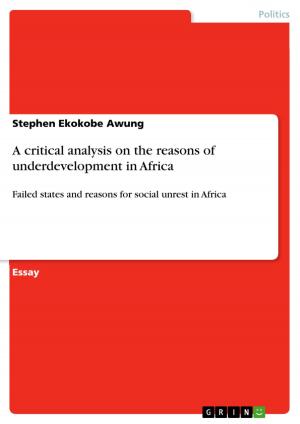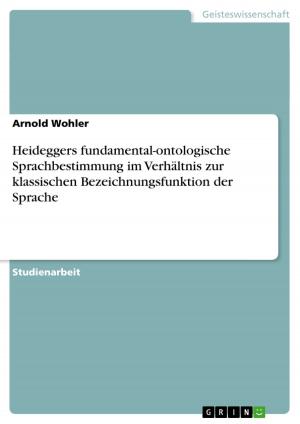Travels with Leni
Juvenile Erotic Fantasy in 20th Century German Culture
Nonfiction, Art & Architecture, General Art, Art History| Author: | Hans-Werner Hess | ISBN: | 9783640931200 |
| Publisher: | GRIN Publishing | Publication: | June 3, 2011 |
| Imprint: | GRIN Publishing | Language: | English |
| Author: | Hans-Werner Hess |
| ISBN: | 9783640931200 |
| Publisher: | GRIN Publishing |
| Publication: | June 3, 2011 |
| Imprint: | GRIN Publishing |
| Language: | English |
Scientific Essay from the year 2011 in the subject Art - History of Art, Hong Kong Baptist Universitiy (Department of Government and International Studies ), language: English, abstract: This essay is a revised and expanded version of a lecture-seminar for students of the Hong Kong Baptist University and the University of Hong Kong (24 September 2010). The topic is an implicitly familiar one for Chinese audiences: an artists's attempt to stay 'true to herself' in changing cultural and social environments - and even when this entails dramatic compromises with political power. The outcome may be aesthetically spectacular. But as the somewhat bizarre life of Leni Riefenstahl shows, that may be possible only if the artistic vision of the self is rather limited and inconsequential. In the light of recent scholarship, the essay discusses Riefenstahl's artistic origins in the Weimar Republic, her subsequent work as dancer, actress, film director and producer in the 1920s and 1930s, as well as her photographic work in the 1970s/1980s and her last film in 2002. Seen over a period of eighty years, Riefenstahl's main theme appears to be remarkably static and simple: the erotic dreams of a young woman bent on self-liberation, camouflaged in radically different stage-settings - up to and including her version of the 1934 Reich Party Day in Nuremberg ('Triumph of the Will').
Scientific Essay from the year 2011 in the subject Art - History of Art, Hong Kong Baptist Universitiy (Department of Government and International Studies ), language: English, abstract: This essay is a revised and expanded version of a lecture-seminar for students of the Hong Kong Baptist University and the University of Hong Kong (24 September 2010). The topic is an implicitly familiar one for Chinese audiences: an artists's attempt to stay 'true to herself' in changing cultural and social environments - and even when this entails dramatic compromises with political power. The outcome may be aesthetically spectacular. But as the somewhat bizarre life of Leni Riefenstahl shows, that may be possible only if the artistic vision of the self is rather limited and inconsequential. In the light of recent scholarship, the essay discusses Riefenstahl's artistic origins in the Weimar Republic, her subsequent work as dancer, actress, film director and producer in the 1920s and 1930s, as well as her photographic work in the 1970s/1980s and her last film in 2002. Seen over a period of eighty years, Riefenstahl's main theme appears to be remarkably static and simple: the erotic dreams of a young woman bent on self-liberation, camouflaged in radically different stage-settings - up to and including her version of the 1934 Reich Party Day in Nuremberg ('Triumph of the Will').















